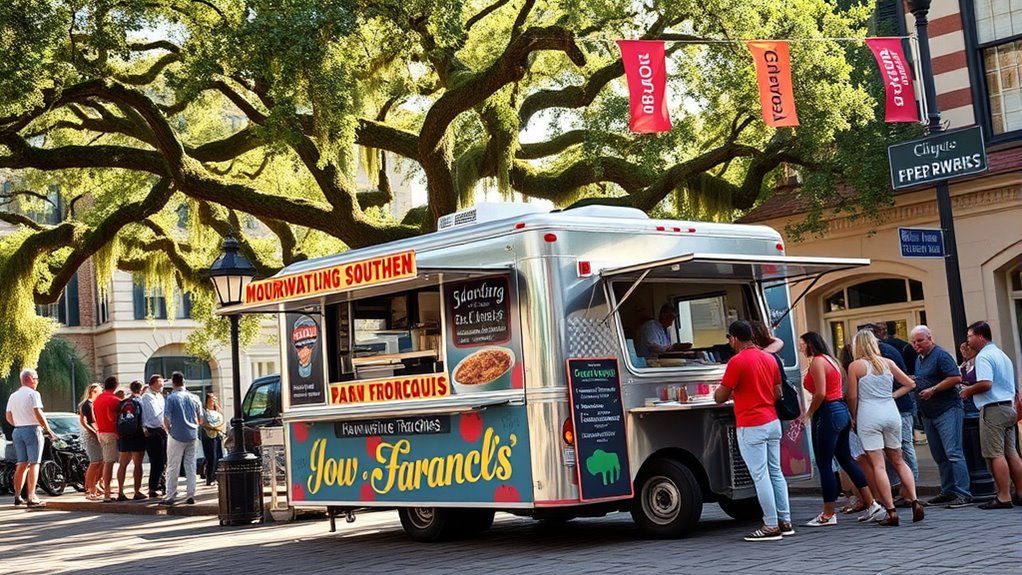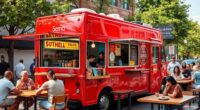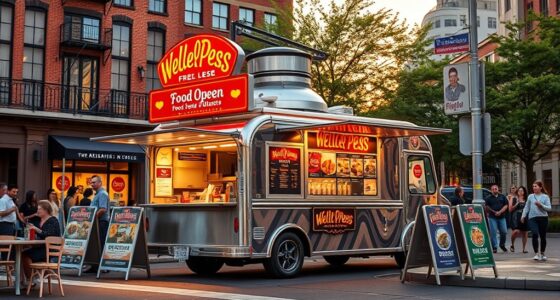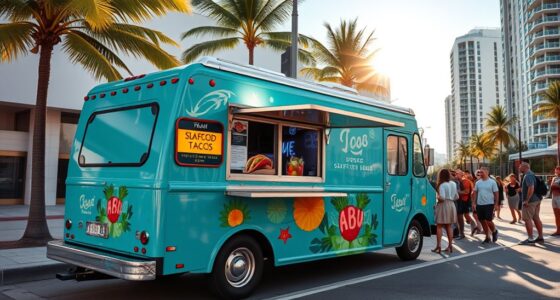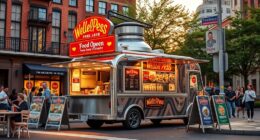To start a food truck in Savannah, Georgia, you’ll need permits like the Mobile Food Service Unit permit, a Business Tax Certificate, and a Food Handler’s Permit for staff. Budget costs include truck purchase, equipment, and ongoing fees, while choosing busy, accessible locations boosts your visibility. You also must set up an approved commissary, develop a compliant menu, and craft marketing strategies to attract customers. Continuing will help you uncover expert tips for a successful launch.
Key Takeaways
- Obtain necessary permits, including MSFU, Business Tax Certificate, and Food Vendor Permits, with annual renewal and health inspections.
- Budget for truck purchase ($30,000–$180,000), equipment, permits (~$250/year), and event fees; plan strategically for location and expenses.
- Operate in approved zones, private property with owner consent, and ensure compliance with parking, distancing, and zoning regulations.
- Set up a compliant commissary close to service areas for food prep, storage, and wastewater disposal, maintaining proper sanitation records.
- Develop a simple, local-flavor menu; leverage social media; participate in community events to boost visibility and customer engagement.
Essential Permits and Licensing Requirements in Savannah
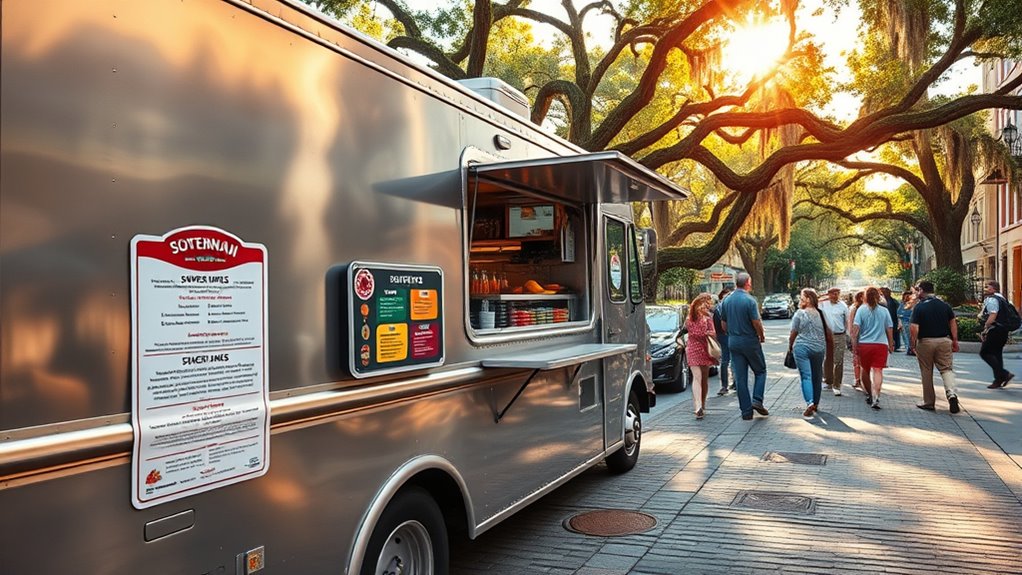
To operate a food truck in Savannah, you need to obtain several essential permits and licenses. First, you must get the Mobile Food Service Unit (MSFU) permit, which is mandatory for all trucks and trailers within city limits. You’ll also need a Business Tax Certificate from the City Revenue Department to operate legally. A Mobile Food Vendor Permit from the local health or licensing department is necessary, and this requires proof of insurance and a health inspection clearance. All employees need a Food Handler’s Permit or Food Manager Certification to ensure food safety compliance. Keep in mind, these permits require annual renewal to maintain your legal status. The application process involves submitting detailed vehicle and menu information, along with supporting documents, to multiple agencies, including zoning and health departments. In Savannah, these permits also ensure compliance with city-specific regulations such as parking restrictions and proximity to schools. Additionally, understanding regulatory compliance is crucial to avoid penalties and ensure smooth operation.
Navigating Costs and Budgeting for Your Food Truck Business
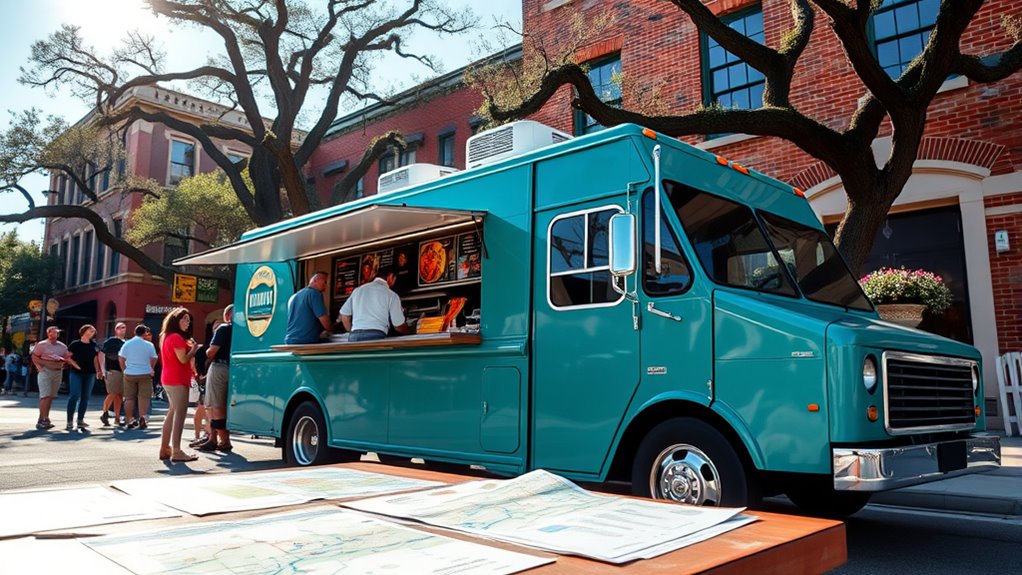
Understanding the costs involved in launching and running your food truck is essential for building a realistic budget and ensuring long-term success. Startup expenses vary widely depending on whether you buy new or used equipment.
- For new trucks, expect to spend between $90,000 and $180,000, while used trucks range from $30,000 to $100,000.
- Equipment costs include grills, fryers, ovens, and refrigeration, totaling around $6,000 to $23,000.
- Don’t forget ongoing expenses such as permits ($250 annually), event entry fees ($200–$500), and insurance, which is crucial for protecting your business.
- Additionally, consider the costs of licensing and local regulations, which can impact your overall budget. Licensing and permits are necessary for legal operation and can vary depending on your location and specific food services offered. Being aware of cost-effective strategies can help you manage expenses more efficiently.
Budget wisely to cover these initial investments, recurring costs, and unexpected expenses, ensuring your food truck’s sustainability in Savannah’s competitive market.
Zoning Rules and Location Strategies for Food Truck Operations
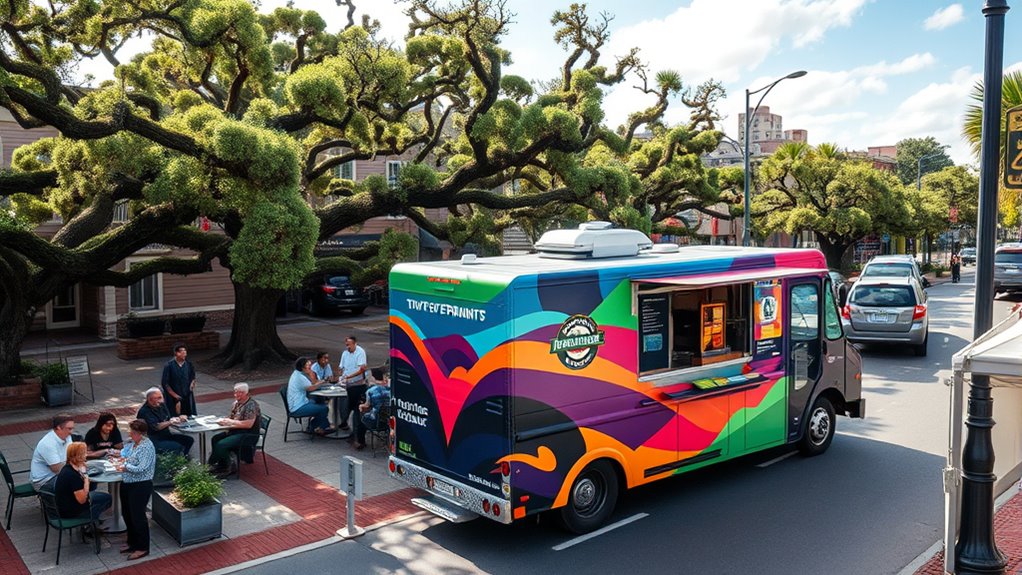
To succeed with your food truck in Savannah, you need to understand the zoning rules that limit where you can operate, including restricted vending zones and public parking areas. You’ll also want to explore private property options, which require owner consent and can offer more flexibility. Knowing these location strategies helps you navigate regulations and find the best spots to serve customers. Additionally, assessing the location metrics such as foot traffic, visibility, and accessibility can significantly impact your sales potential.
Restricted Vending Zones
Mastering Savannah’s food truck scene requires careful attention to zoning restrictions that define where you can operate. The city designates specific zones for food truck vending, often excluding historic districts to preserve neighborhood character. Operating outside approved zones risks fines or permit revocation. You can use private property with written owner consent or participate in temporary public event zones. Additionally, selecting the right planter design can enhance outdoor dining areas and attract more customers.
Consider these key points:
- Food trucks must stay within approved zoning districts, avoiding prohibited areas.
- Maintain at least 200 feet from brick-and-mortar restaurants unless you secure signed consent.
- Avoid public rights-of-way unless during city-sanctioned events, and always get property owner approval for private sites.
Strict adherence guarantees legal operation and smooth integration into Savannah’s vibrant food scene.
Permitted Public Parking
Savannah’s food truck operators must carefully select permitted public parking areas that comply with city zoning rules. You can only operate in approved districts defined by the Savannah Zoning Ordinance, and conducting business in the public right-of-way is limited to special events pre-approved by the City Manager. You cannot leave your truck unattended or store it when not actively serving. Maintain a minimum pedestrian clearance of 9 feet from your service window to ensure foot traffic flows freely. Additionally, avoid operating within 200 feet of licensed brick-and-mortar restaurants unless you have signed consent, which must be renewed annually. Always verify your location adheres to city regulations, and avoid obstructing pedestrian or vehicle pathways to keep your operation compliant and safe. Using a professional voiceover can help promote your food truck effectively and attract more customers.
Private Property Use
Operating a food truck on private property in Savannah requires strict adherence to zoning rules and location strategies. You must operate only in approved zoning districts and obtain written consent from property owners before setting up. Additionally, guarantee your truck stays at least 200 feet from existing licensed eateries unless you secure written permission. Kia Tuning options can be explored to improve your vehicle’s performance and appeal for customer attraction.
To comply, consider these key points:
- Verify zoning compliance and secure property owner approval before operation.
- Maintain pedestrian clearance of at least nine feet from your service window.
- Avoid amplified sound devices and follow wastewater management standards.
Always have your Mobile Food Service Unit Permit, Business Tax Certificate, and health inspections in place. Proper planning ensures legal operation and maximizes your potential customer base on private property.
Setting Up Your Commissary and Ensuring Food Safety Compliance
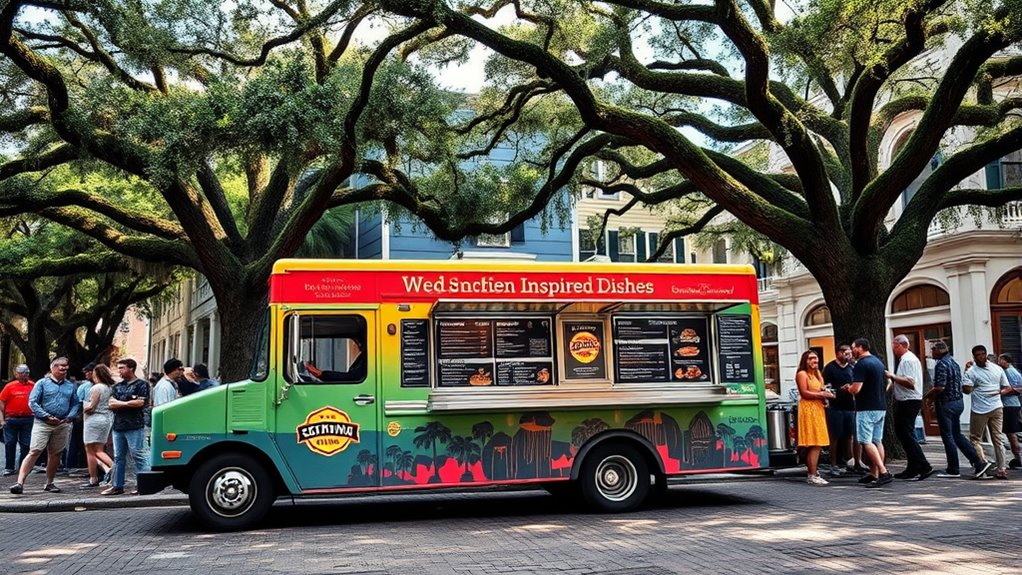
Setting up your commissary and ensuring food safety compliance are essential steps for running a successful food truck in Georgia. Your commissary must be a separate, approved location where all food storage, preparation, and wastewater disposal occur. You’re required to return there daily for cleaning and restocking. Both your commissary and truck need separate permits from the local health department, which involve submitting menus, layout diagrams, and photos. Inspections are unannounced and focus on sanitation, temperature control, and waste practices. Your commissary should be within reasonable distance for daily operations and have access to restrooms within 200 feet. Wastewater must be transported back to the commissary for proper disposal, and all waste must be collected and discarded regularly to prevent contamination. Additionally, maintaining detailed records of waste disposal and food handling is crucial for compliance during health inspections. Proper documentation helps demonstrate adherence to food safety regulations and can streamline the approval process.
Crafting a Menu That Meets Regulations and Attracts Customers
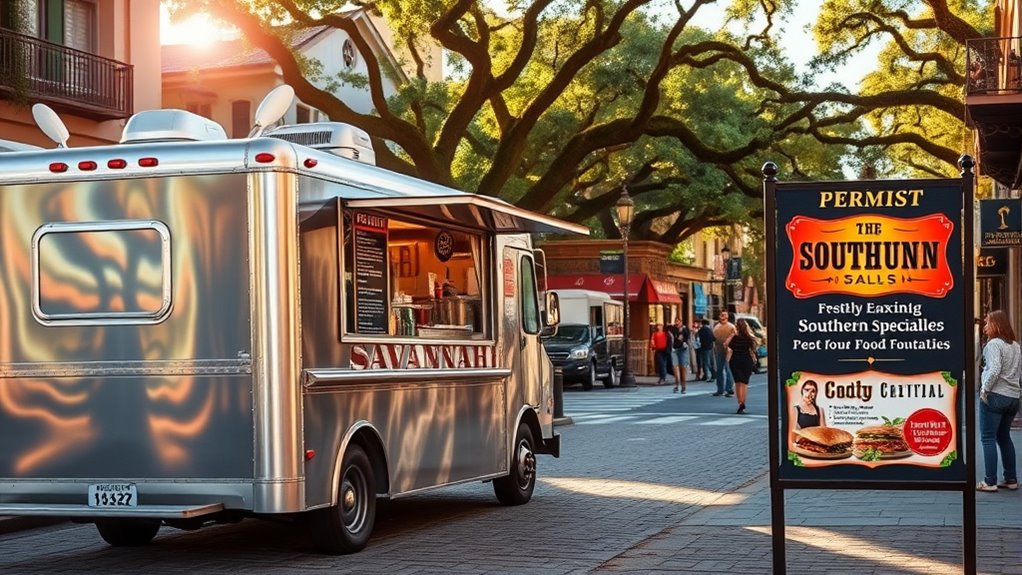
Creating a menu that complies with health and safety regulations while appealing to customers is key to a successful food truck operation in Savannah. You must guarantee all menu items are prepared under sanitary conditions, either on the truck or at a licensed commissary. Focus on offering simple, fully cooked, or reheatable foods—avoiding raw or undercooked options unless you have specialized permits. Additionally, design your menu to match operational restrictions: prioritize quick, portable items that don’t require seating or prolonged eating. Consider these key points: 1. Use approved containers and packaging meeting local health codes. 2. Limit menu complexity to fit your truck’s size and equipment. 3. Incorporate local flavors and seasonal specials to attract diverse customers. Incorporating regulatory compliance ensures your menu remains safe and legal, fostering trust with your customers.
Effective Marketing and Business Strategies for Food Truck Success
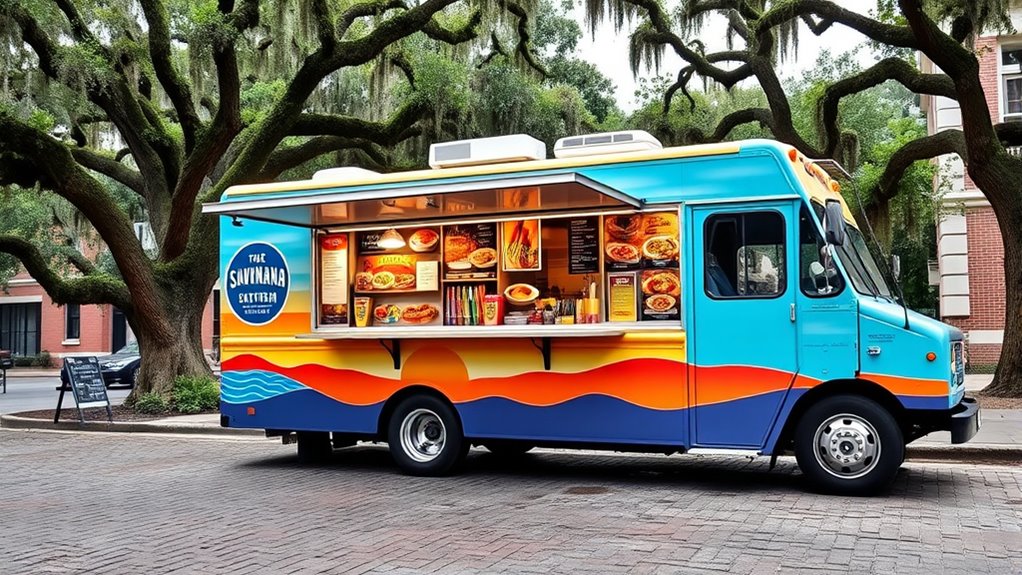
To succeed, you need to focus on creating unique menu offerings that stand out and attract attention. Leveraging social media platforms like Facebook can boost your visibility and sales, especially when you engage regularly with your audience. Participating in local events and festivals also helps increase your truck’s exposure and builds a loyal customer base. Additionally, implementing loyalty programs and seasonal promotions can lead to a 30% increase in repeat visits, further strengthening customer relationships. Incorporating hydrocolloid technology into your promotional strategy can emphasize the effectiveness of your offerings and attract health-conscious customers.
Unique Menu Offerings
Unique menu offerings are essential for food trucks aiming to stand out in a competitive market. Emphasizing authentic, culturally rooted dishes helps attract customers seeking genuine flavors. Sharing the stories behind your dishes can boost engagement, especially among Gen Z, who appreciate identity-driven brands. You can differentiate your truck by featuring ethnic specialties like Ethiopian, Moroccan, or Nigerian cuisine, and by highlighting your team’s background and menu origins. Hamburgers also remain a popular and versatile option that can be customized to reflect regional tastes or innovative twists. Additionally, incorporating health-conscious options taps into current trends. Consider plant-based, gluten-free, or keto items, which appeal to wellness-focused consumers. To maximize impact, streamline your menu with 4–6 specialty items, showcase sustainability by using surplus ingredients creatively, and develop niche, themed offerings that create memorable experiences. Incorporating menu differentiation strategies helps you better connect with your target audience and build a loyal customer base.
Social Media Engagement
Effective social media engagement is essential for food trucks looking to grow their customer base and build loyalty. High-quality images and engaging videos, like reels, attract followers and spark interest. Tailor your content to each platform: use Instagram for visuals, Facebook for promotions, and Twitter for quick updates. Incorporate hashtags related to your cuisine, location, and industry to reach niche audiences. Share user-generated content to build trust and authenticity. Keep followers informed with regular updates on locations, menu changes, and special events. Respond promptly to comments and messages to foster relationships. Combine organic posts with targeted paid ads to boost visibility and attract new customers. Behind-the-scenes videos, cooking demos, and local flavors help humanize your brand and strengthen customer connections. Consistently analyzing engagement data allows you to refine your content strategy and ensure ongoing relevance and effectiveness.
Strategic Event Participation
Participating in festivals and community events offers food trucks a prime opportunity to boost visibility and attract new customers. These gatherings generate high foot traffic and create a festive atmosphere ideal for customer engagement. To maximize your impact, consider these strategies:
- Collaborate with local businesses like breweries or bookstores during events to expand your reach and enhance the customer experience.
- Offer event-specific menu items or specials that tie into the theme, encouraging more sales.
- Use branded trucks and sensory elements such as aromas or selfie stations to attract attention and generate organic social content.
- Hyper-local marketing emphasizes engaging directly with the community, making these events especially effective for building lasting relationships and loyalty among nearby customers.
Strategic event participation helps you build relationships, increase brand awareness, and drive immediate sales, making it a essential component of your marketing plan.
Frequently Asked Questions
How Long Does the Permit Approval Process Typically Take in Savannah?
You’re probably wondering how long the permit approval takes in Savannah. Usually, the process lasts about two weeks, including application, inspections, and approvals. To speed things up, make sure you prepare all documents in advance, like health permits and lease agreements. Start your application early in the year, stay in touch with city departments, and be ready for site visits. This proactive approach helps avoid delays and keeps your plans on track.
Are There Specific Hours When Food Trucks Are Allowed to Operate?
You’re probably wondering about operating hours for food trucks. In Savannah, you can run your truck from 8 a.m. to 10 p.m. daily in most zones. Some areas, like North Ellis Square, allow extended hours until 4 a.m. Thursday through Sunday. Just remember, operating outside these hours without approval can lead to fines or permit issues. It’s essential to follow these rules for smooth, compliant operations.
Can I Operate My Food Truck Without a Commissary in Savannah?
Imagine a ship without a harbor—you’re sailing, but there’s no safe port to dock. In Savannah, you can’t operate your food truck without a commissary, as it’s your harbor for safety, cleanliness, and legal compliance. Operating without one risks fines or closure. You must have a designated base for food prep, storage, and waste disposal, ensuring your truck stays afloat and adheres to local laws.
What Are the Penalties for Operating Without Proper Permits in Savannah?
If you operate your food truck without proper permits in Savannah, you face serious penalties. You could be fined $500 for the first violation, $750 for the second, and $1,000 plus a six-month permit suspension for the third. Authorities can also revoke your permit or take legal action. To avoid fines and enforcement, always display valid permits, follow health and safety laws, and guarantee you’re compliant with all local regulations.
How Often Do I Need to Renew My Permits and Licenses?
You need to renew your permits and licenses annually in Savannah. This includes your Mobile Food Service Unit permit, Business Tax Certificate, and food service permits. Make sure to submit renewal applications before the February 28 deadline to avoid fines or shutdowns. Keep track of renewal dates, pay fees, and pass inspections. Staying compliant guarantees your food truck operates smoothly and avoids costly penalties or permit revocations.
Conclusion
Starting your food truck in Savannah is a journey worth taking, but don’t forget it’s a balancing act. Keep all permits in check, budget wisely, and choose your spots carefully. With a tasty menu and smart marketing, you’ll be cooking up success in no time. Remember, if you play your cards right, you’ll be sitting pretty and turning heads, proving that with the right planning, you can make your food truck dreams a tasty reality.
